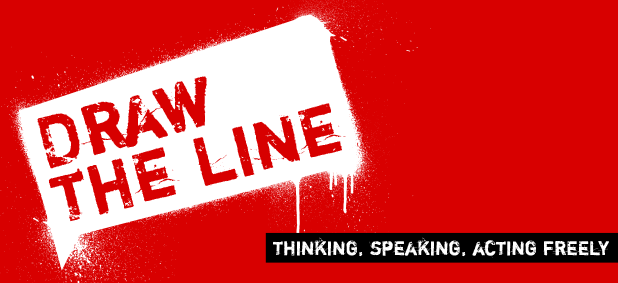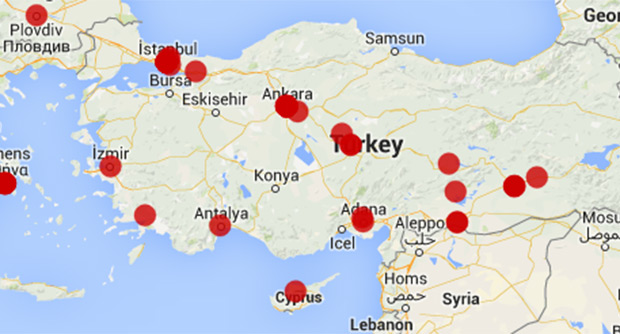15 Dec 2014 | About Index, Campaigns, Statements
Index on Censorship joins the net neutrality coalition, a global coalition of organisations and users who believe that the open internet has enabled countless advances in technology, health, education and business, and that it must remain open for all.
Today, the open internet is endangered by powerful service providers seeking to become gatekeepers who decide how users can access part of the internet.
We believe that we have to enshrine net neutrality into law so that the internet remains a platform for free expression and innovation.
“A free and open internet is vital for free expression,” said Index Chief Executive Jodie Ginsberg. “We must defend net neutrality to ensure everyone has equal access to the channels that have become crucial to so much of modern information exchange.”
Join us and find out more at http://www.thisisnetneutrality.org/
Watch the video below on how net neutrality works:
15 Dec 2014 | Awards, News, Turkey
Şanar Yurdatapan is a songwriter and composer who campaigns for freedom of expression, particularly against the prosecution of publishers in his home country, Turkey.
Yurdatapan won the 2002 Index award for Circumvention of Censorship, to his amusement this was the same year former Italian prime minister Silvio Berlusconi won the award for Services to Censorship.
In 2013, Yurdatapan and Index met at the IFEX General Meeting and Strategy Conference, which he attended on behalf of Initiative for Freedom of Expression; he talked to Index about the Gezi Park protests which were going on at the time. Now, Yurdatapan speaks about the positive effects of international recognition.
Explore the Index on Censorship Freedom of Expression Awards
This article was posted on 15 Dec 2014 at indexoncensorship.org
15 Dec 2014 | About Index, Draw the Line, Young Writers / Artists Programme

Religious freedom and religious radicalism which leads to extremism has become an increasingly difficult balancing act in the digital age where presenting religious superiority through fear and “terror” is possible both locally and internationally at internet speeds.
The ongoing series of beheading videos released by the Islamic State and the showcase of kidnapped school girls by Nigeria’s Boko Haram on YouTube are both examples that test the extent to which the UN Convention of Human Rights can protect religious freedoms. According to a report by the International Humanist and Ethical Union, Egypt’s Youth Ministry are targeting young atheists vocal on social media about the dangers of religion. In Saudi Arabia, Raef Badawi was sentenced to seven years in prison in 2013 and received 600 lashes for discussing other versions of Islam, besides Wahhabism, online.
Article 18 of the Convention states that the “right includes freedom to change his religion or belief, and freedom, either alone or in community with others and in public or private to manifest his religion or belief in teaching, practice, worship and observance”. The interpretation of “practice” is a grey area – especially when the idea of violence as a form of punishment can be understood differently across various cultures. Is it right to criticise societies operating under Sharia law that include amputation as punishment, ‘hadd’ offences that include theft, and stoning for committing adultery?
Religious extremism should not only be questioned under the categories of violence or social unrest. Earlier this month, religious preservation in India has led to the banning of a Bollywood film scene deemed ‘un-Islamic’ in values. The actress in question was from Pakistan, and sentenced to 26 years in prison for acting out a marriage scene depicting the Prophet Muhammad’s daughter. In Russia, the state has banned the publication of Jehovah’s Witness material as the views are considered extremist.
In an environment where religious freedom is tested under different laws and cultures, where do you draw the line on international grounds to foster positive forms of belief?
This article was posted on 15 December 2014 at indexoncensorship.org
15 Dec 2014 | News, Politics and Society, Turkey

On Sunday, December 14, at least 27 people were detained by Turkish police, including journalists, producers and directors of TV shows and police officers. Arrest warrants were issued for at least 31.
The offices of the newspaper Zaman and of the television network Samanyolu TV were raided by police. A warrant for the arrest of Zaman editor in chief Ekrem Dumanlı was at first incomplete, prompting police to return later on Sunday to arrest Dumanlı. Hidayet Karaca, manager of Samanyolu TV, was also detained, as well as Samanyolu producer Salih Asan and director Engin Koç, who were arrested in the city Eskişehir. Warrants were also issued for Makbule Çam Alemdağ, a writer for a Samanyolu show, and Nuh Gönültaş, a columnist for the newspaper Bugün. Bianet has published a list of those detained yesterday.
A large group of protesters gathered outside of Zaman’s Istanbul offices, holding signs that read “Free press cannot be silenced”.
Zaman and Samanyolu TV have been singled out by Turkish President Erdogan for being part of what Erdogan calls a “parallel structure” affiliated with exiled cleric Fethullah Gülen. Erdogan has accused Gülen of being at the centre of plots to topple the government.
The prosecutor in charge of Sunday’s operation said that those detained are being charged with involvement in a terrorist organisation, while some are accused of fraud and slander.
The raids were announced by the Twitter user “Fuat Avni” (a pseudonym) on December 13. Fuat Avni tweeted a list of 47 people for whom there would be arrest warrants.
On Monday Turkish President Recep Tayyip Erdogan attacked the European Union for criticising the arrests that targeted opposition media outlets, telling the EU to “mind its own business.”
“The European Union cannot interfere in steps taken … within the rule of law against elements that threaten our national security,” Erdogan said in a televised speech. “They should mind their own business,” he added, in his first comments after Sunday’s raids.
EU foreign policy chief Federica Mogherini and enlargement commissioner Johannes Hahn on Sunday condemned police raids as going “against the European values” and said they were “incompatible with the freedom of media, which is a core principle of democracy.”
Recent media freedom violations from Turkey via mediafreedom.ushahidi.com:
EU project overshadowed by arbitrary media ban
BirGün newspaper to undergo investigation for critical coverage
Journalists assaulted, prevented from photographing
Economist and Taraf correspondent threatened on Twitter
Journalist sentenced to community service for insult
This article was updated on 15 December 2014 at indexoncensorship.org
This article was originally and updated at mediafreedom.ushahidi.com on 15 December 2014


